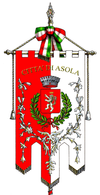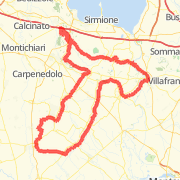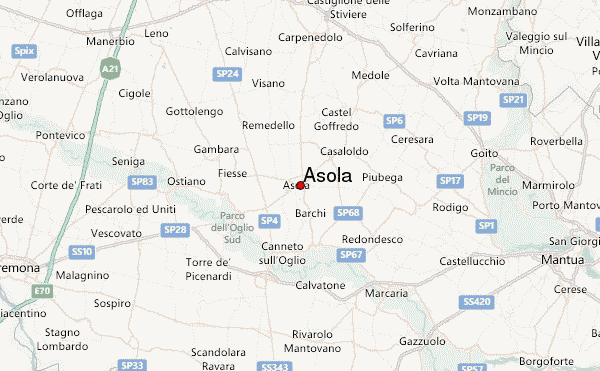Asola, Lombardy
Asola ( Asula in Mantuan dialect) is a town with 10,080 inhabitants ( 2009) in the province of Mantua in Lombardy.
History
Asola was probably founded in the 2nd century BC by the Gallic Cenomani. Become 180 BC Roman municipium, it came after the fall of the Roman Empire under the rule of the Lombards and Carolingians. As part of the consolidation of the Signoria, the city came under the influence of Brescia, but a relative autonomy could retain under the so -called " square ".
The city has long been dominated by Gonzaga, the lords of Mantua as by the Visconti of Milan and Brescia. In 1440, she opted for the Republic of Venice. The Serenissima could improve the strategic position of the city and turned it into a fortress. They also promoted economy and culture, preserved the autonomy and let the old privileges unaffected ( città nulliparous subdita ).
The main church Asolas was until 1818 the cathedral and bishop's seat of a diocese.
With the fall of the Venetian Republic in 1797 by Napoleon, the city became part of the provisional government of Brescia and went gradually into the Cisalpine Republic, later called Repubblica Italiana ( 1802-1805 ), and finally the Kingdom of Italy. With the end of Napoleonic rule in 1814 it became part of the Kingdom of Lombardy-Venetia, depending on Empire of Austria.
Many Asolaner took part in the battles of the Risorgimento and in Asola themselves were historical figures such as Carlo Alberto, Umberto and Giuseppe Garibaldi.
After the Second Independence or Sardinian War in 1859 Asola was annexed by the Kingdom of Sardinia, until 1861 the Kingdom of Italy was born. The new state founded schools of all levels for children, which were built by Ferrante Aporti, and the school was funded by Antonio Schiantarelli. This gave further impetus to increase production.
The city was reached in 1893 by the railway line Parma -Brescia and 1886-1934 trams went to Mantua and 1929-1955 to Cremona.
As a "noble walled city " in the Middle Ages recognized, Asola has since 1951 again municipal rights with its monuments and its thousand- year history.
Twinning
- Germany Leingarten, Germany, since 2004
- France Lésigny, France, since 2004
Sons and daughters of the community
- Nino Mozzo (1911-1978), cyclist






mn-as.gif)

